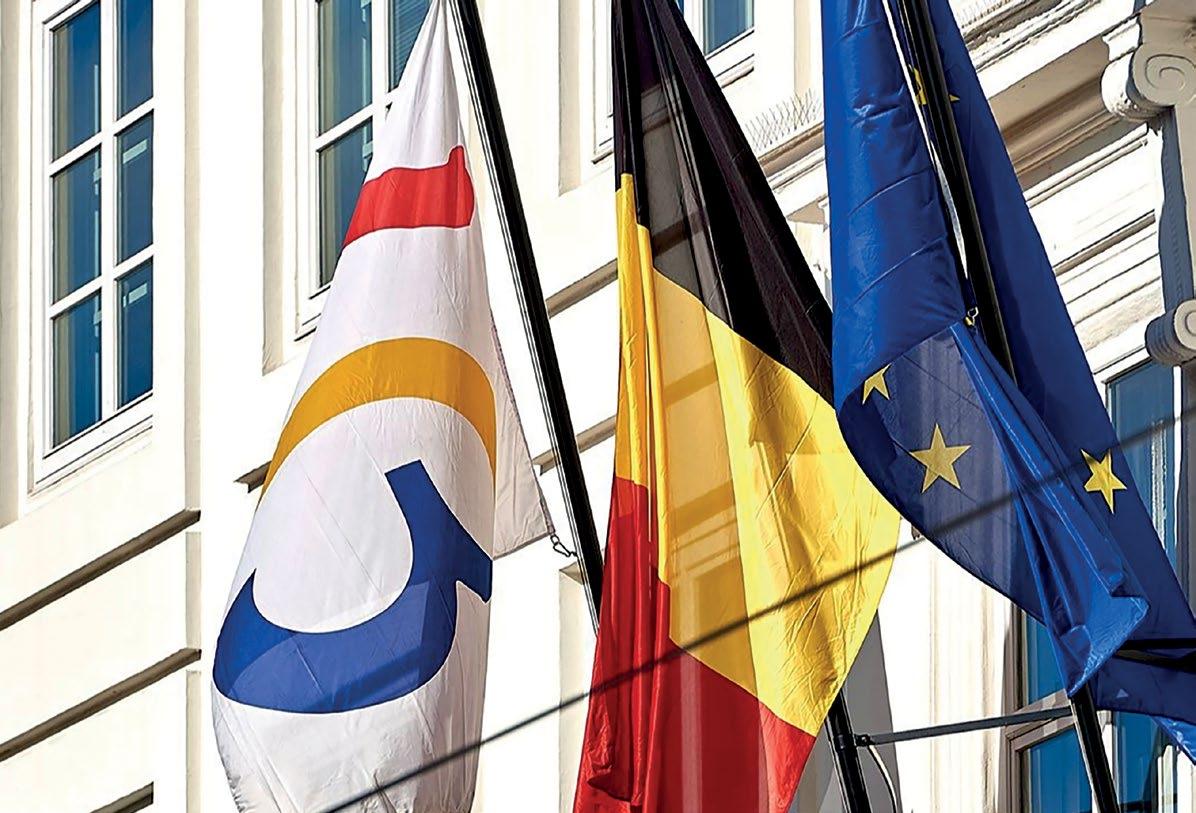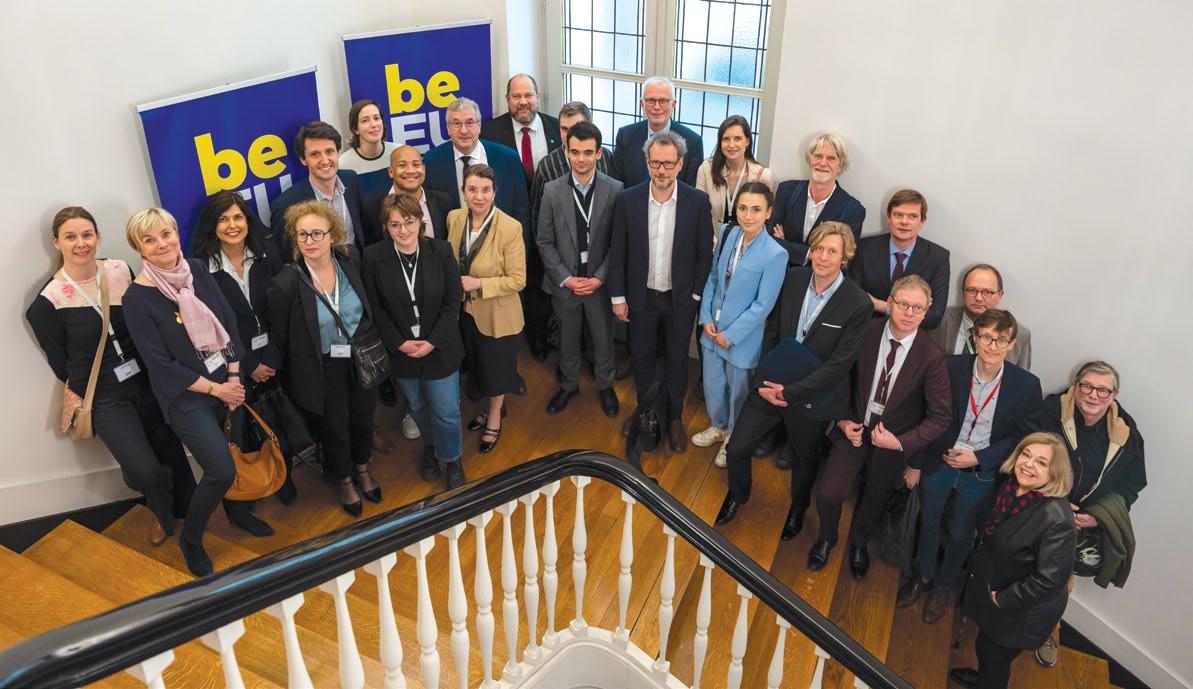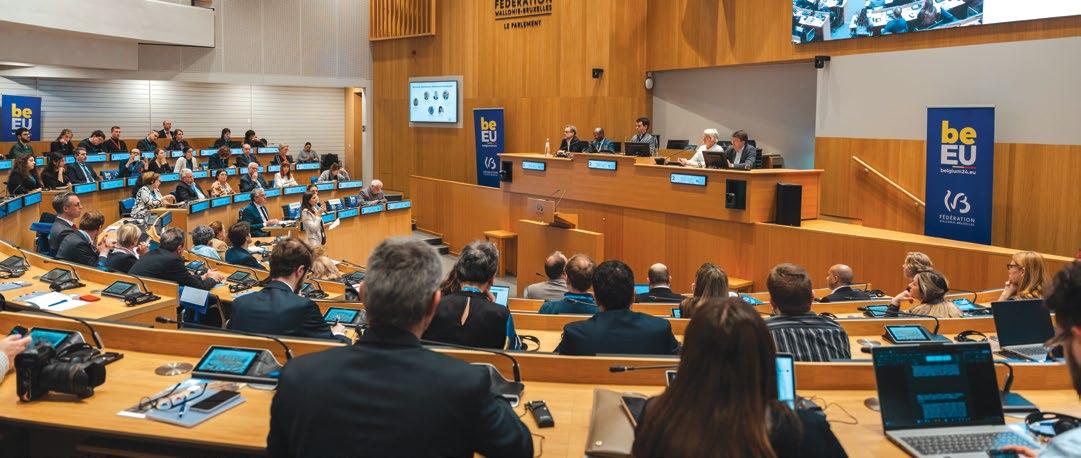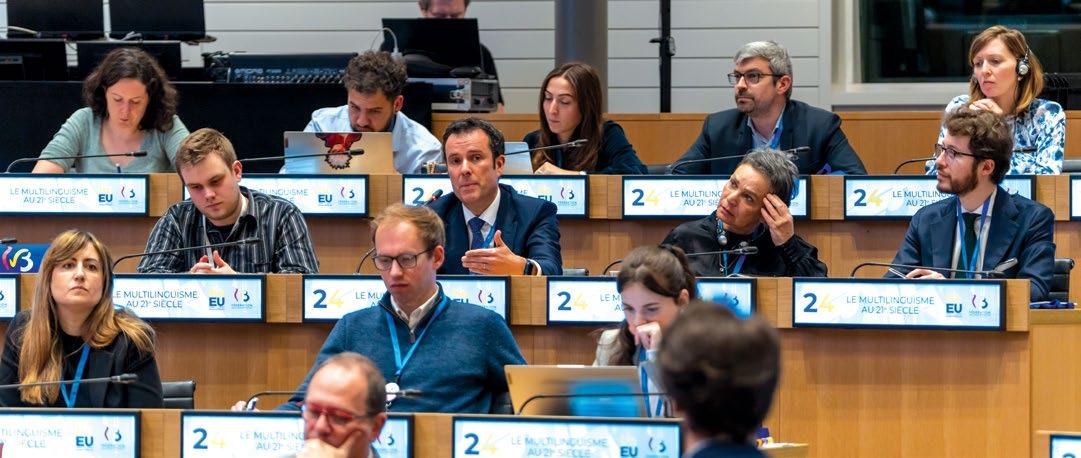MULTILINGUALISM IN THE 21st CENTURY
Between challenges and opportunities

Report from the conference held on Monday 8 April 2024 at the Parliament of the French Community, organised as part of the Belgian Presidency of the Council of the European Union.
An initiative of the Minister-President of the French Community in partnership with Wallonia-Brussels International (WBI) and the General Delegation of the French Community to the European Union.

© Elodie Meunier –WBI
“UNITED IN DIVERSITY”
As part of the Belgian Presidency of the Council of the European Union, the French Community, in partnership with Wallonia-Brussels International (WBI) and the General Delegation of the French Community to the European Union, has organised a one-day conference to continue the reflection begun by the French Presidency on multilingualism within the European Union.
With 24 official languages and almost 60 regional languages, the European Union (EU) is a veritable linguistic mosaic. Multilingualism is at the heart of the European project and forms part of the Charter of Fundamental Rights within the EU. Europe has introduced a language policy aimed at communicating with its citizens in their own language, while promoting the learning of other languages. Preserving multilingualism means not only helping to guarantee linguistic and cultural diversity, but also strengthening the links between European citizens and building a more inclusive, democratic and peaceful Europe.
But what do we mean by multilingualism? First and foremost, it means encouraging the mastery of mother tongues as people best express their thoughts and emotions as well as the cultural and historical richness of their community, with the greatest precision and nuance through their language of origin. A lan -
guage carries with it the history, traditions and values of those who speak it.
It also means promoting the learning of other languages. Learning another language means opening a new window on the world, on other ways of thinking or, more concretely, offering yourself additional professional opportunities.
The many facets of multilingualism were explored at this one-day conference organised around four round tables. The first two examined the role of multilingualism in our societies, and particularly in the European institutions, highlighting its impact on the construction of democracy, social cohesion and the preservation of cultural diversity. The next two dealt with the challenges and opportunities presented by artificial intelligence, and educational policies to promote multilingualism among young people in a context of increasing mobility in Europe. In addition, the desire to involve young people in the discussions was demonstrated by the participation of young panellists, as well as by the invitation and presence in the audience of students and a delegation from the European School.
This booklet summarises the key ideas raised by the speakers on the day. These actions are fully in line with the motto of the European Union: “United in diversity”.
Multilingualism in the 21st century: between challenges and opportunities 3
HOW CAN LINGUISTIC DIVERSITY AND MULTILINGUALISM BE PROMOTED WITHIN THE EUROPEAN INSTITUTIONS?
The European Union is committed to protecting multilingualism and enabling everyone to express themselves in one of the EU’s 24 official languages. However, it has to be said that English is becoming the lingua franca within the institutions, despite Brexit.
In theory, the European Union has all the tools it needs to be a truly multilingual area. But in practice, English tends to prevail for reasons related to the cost of translation, speed in negotiations, because it is the “common denominator” between individuals, or because it is perceived as the language of a more educated elite. However, we could ask ourselves what the consequences are of this domination of a language that is no longer the mother tongue of more than a tiny minority of European citizens, and which is only understood by a minority of them. What is more, the English used within institutions is often only a utilitarian version, which does not allow those who use it to express all the nuances that can be brought to bear in their own language. The dominance of English also presents a democratic risk because it is essential that we communicate with for European citizens in their own language for them to feel listened to, concerned and close to Europe. In addition, the use of English creates a distance between the institutions and European citizens, encouraging the emergence of populist movements within the Member States. The Euro-
pean Parliament is the only multinational parliament in the world elected by universal suffrage. To preserve its identity, it is important to promote the use of all the languages of the citizens who elected those who sit on it.
WINDOWS ON THE WORLD
Far from wanting to banish English, the focus should be on promoting an excellent command of one’s mother tongue as well as learning other languages, from a very early age. Learning another language opens a window onto another reality. It means acquiring tangible knowledge, but also intangible knowledge, like a culture, a way of understanding the world.
The use of all official languages within the institutions is also a major challenge. France and the French Community are also offering diplomats and negotiators from the Permanent Representations in Brussels an initiative to help them learn French through the “Millefeuille-Spa” programme, which offers language courses and residential stays. Despite the advent of artificial intelligence, which saves time on certain translation tasks, it is just as important to maintain accredited translators within the European institutions and to avoid the trend towards freelance translators, in order to guarantee a fair and nuanced expression of the thoughts of all those who enact the regulatory framework in which Europeans live.
4
Text based on the words of
– Olga Cosmidou, former Director General for Translation at the European Parliament;
– Jean Quatremer, Brussels correspondent for Libération;
– Marcos Alonso Alonso, Permanent Representative of Spain to the EU;
– Natacha Ficarelli, Counsellor, French Presence in the European Institutions, Permanent Representation of France to the European Union;
– Luca Maicon Vinicius Bellavia, student at the Université libre de Bruxelles.
The round table was moderated by Geoffrey Grandjean, Professor and Chair of the Department of Political Science at the University of Liège.
Key recommendations
– Encouraging the use of the mother tongue;
– Maintaining human resources for translation and interpreting;
– Develop and continue to strengthen mobility programmes such as Erasmus+ to make language learning attractive and accessible to all;
– Remain adamant about the multilingual nature of EPSO competitions.
“Every language is the embodiment of a culture“

Multilingualism in the 21st century: between challenges and opportunities 5
ARTIFICIAL INTELLIGENCE AND LINGUISTIC DIVERSITY: BETWEEN PROMISE AND CAUTION..
Artificial intelligence (AI) has developed considerably in recent years, particularly in the field of languages. Whether it is learning a new language or translating a text, AI is now capable of meeting a large number of our needs. While some are delighted, others question the risks of such advances.
The revolution is ongoing and generative AI now offers extraordinary prospects. Not only can it perform ‘simple’ tasks such as writing texts, it can also create images and other content based on simple queries. Its use is becoming more and more crucial, rather than a luxury reserved for certain people, particularly within companies. It is in response to this imperative that the EU has taken initiatives - such as the Alliance for Linguistic Technologies - European Digital Infrastructure Consortium (ALT-EDIC) - with the aim of remedying the scarcity of European linguistic data available for the training of artificial intelligence solutions, as well as developing linguistic technologies and supporting their dissemination across the industrial fabric, including small and medium-sized enterprises (SMEs). ALT-EDIC aims to promote digital competitiveness, preserve linguistic diversity and protect Europe’s cultural wealth.
In linguistic terms, artificial intelligence is a formidable tool that facilitates translation and language learning. Language teachers need to be made more aware of the use of these technologies, while maintaining an ethical and diversified framework, to make teaching more effective and more attractive.
PEOPLE REMAIN ESSENTIAL
AI needs to be used with caution, as it still has many limitations. For example, it tends to amplify the cultural or gender biases present in our societies, as it only uses the data that we feed into the system.
The same applies to linguistic inequities, not all languages are equally well represented. As an example, 90% of online content is currently in English. As a result, translating certain terms into a specific language can be more difficult than in others, and some languages are even entirely absent from artificial intelligence tools. Overall, there is a risk of language impoverishment and standardisation as a result of the increasing use of machines. It is therefore essential to rebalance the presence of the different languages to avoid these undesirable effects.
While some fear that AI will replace certain jobs, it is important to remember that nothing can replace a human being. Machines do not have access to the culture and the essence behind the words and only translators can translate words, perceiving all their nuance and finesse, and putting them into their proper context. Cultural players, for example, are already using AI as a collaborative tool. It has removed many of the obstacles to creation, but it is still people who make the important choices.
In the context of multilingualism, AI is therefore an excellent tool for simple tasks, but there is no substitute for language learning and cultural immersion for quality exchanges.
6
Text based on the words of
– Marie-Catherine de Marneffe, researcher at the UCLouvain Centre for Automatic Language Processing;
– Zoé Broisson, linguist and entrepreneur, CEO of Flowchase;
– Philippe Gelin, Head of Multilingualism, DG CONNECT, European Commission;
– Marie du Chastel, curator and artistic director of the KIKK festival;
– Simon Copet, student at the University of Mons.
The round table was moderated by Nathanaël Ackerman, Director General of the IA4Belgium coalition and Head of IA at the Federal Public Service Strategy and Support.
Key recommendations
– Implement policies and regulations that promote linguistic and cultural diversity;
– Encourage initiatives to develop diversified and ethical European language solutions, and make them accessible to all industrial structures, including SMEs;
– Raising awareness of the use of language technologies among teachers and students;
– Support the creative industries in adopting generative AI as a collaborative tool.
“Artificial intelligence does not have access to the essence behind the words”

Multilingualism in the 21st century: between challenges and opportunities 7
ARE YOUNG PEOPLE THE FUTURE OF A LINGUISTICALLY DIVERSE IN EUROPE?
In a multilingual world, it is vital to make an effort to understand each other across borders whether a Belgium divided by a language border or a Europe made up of 27 Member States. To encourage the younger generations to prepare for this, Europe’s mission is to maximise the effectiveness of language teaching in education programmes. Knowledge of several European languages is crucial for the professional and personal development of young people today.
Multilingualism is a tool with two facets. On the one hand, it ensures collaboration and good understanding within a country, Europe or the world, and on the other, it is a cultural tool that creates a European identity and preserves its cultural diversity. It is also a way of escaping a single cultural representation.
The Recommendation of the Council of the European Union of 22 May 2019 for a comprehensive approach to language teaching and learning encourages Member States to make language teaching a priority in education programmes. As well as achieving a perfect command of the language of education, young people are encouraged to acquire a good level of competence in a second European language, as well as a conversational level in a third European language.
By way of support, the European Union has almost doubled the budget for the Erasmus+ programme (26 billion for the period 2021 - 2027) and expanded its target audience. From an early age through to university studies and entry into the job market, young people from all backgrounds can take part in immersion
programmes, such as studying or volunteering abroad, as a way of immersing themselves in their chosen language. Within the French Community, the International Youth Bureau (BIJ) provides practical and financial assistance to enable 18-35 year-olds to gain international experience outside the classroom.
LINGUISTIC DIVERSITY IS OUR CULTURAL WEALTH
To ensure high-quality teaching, it is important to support teachers by offering training and language immersion for both them and their pupils. The aim is to raise awareness of the importance of the spoken language and immersion for teachers and pupils, even at primary and secondary level. Whether internationally or within the country itself, mobility must be facilitated to enable this immersion. Another learning tool that is proving highly effective with pupils of all ages is the media, and in particular series and films in their original subtitled version. By immersing yourself in a language in this fun way, you will quickly reach a level of comprehension, which is the first step in learning and can sometimes even be enough to use the language as you wish.
Beyond the practical side of multilingualism, it also forms an essential part of European identity. The cultural identity that is interwoven with each language or dialect and forms part of our personal identities can only be preserved in a world that maintains its interculturality and multilingualism. Knowledge of a language opens up a unique window on the world, and the more windows there are open, the clearer the vision and the greater the potential for healthy and effective collaboration across borders.
8
Text based on the words of
– Joyce Azar, journalist at RTBF and editor-in-chief of DaarDaar;
– Anna Solé Mena, Policy Officer at the European Commission and expert in multilingualism;
– Johanna Dirlewanger-Lücke, co-president of Volt Belgium;
– Christophe Gigaudaut, Delegate for Francophone Affairs at the French Ministry of Europe and Foreign Affairs;
– Alice Perna, student at the University of Liège.
The round table was moderated by Nicolas Willems, Director of Communications at Wallonia-Brussels International (WBI).
Key recommendations
– Seize every opportunity to learn languages while you are young. It is not a question of mastering the language perfectly, but of learning it and practising it, of daring to speak;
– Personalised language learning. Everyone should be able to use the method that suits them best (fun activities, subtitling or the possibilities offered by AI);
– Rethinking language learning methods in schools, providing better training for teachers and encouraging exchanges between pupils and teachers across linguistic borders;
–
Improve communication about existing opportunities for young people, such as Erasmus+, volunteering and the European Solidarity Corps, and make them more inclusive.
“The European Union wants every young person to be able to speak three languages”

Multilingualism in the 21st century: between challenges and opportunities 9
MULTILINGUALISM, A VECTOR FOR DEMOCRACY
A language is much more than just a set of words; a language is a vehicle for values, ideologies and emotions. It is the vehicle for sharing opinions and contributing to the debate on ideas. That is why it is essential that every language in the European Union can exist if we are to preserve a vibrant and plural democracy.
When different languages coexist within an institution, it is not uncommon for one of them to gain the upper hand. This is true for English, which is slowly becoming the sole working language within the EU. However, when one language is imposed on a linguistically diverse population, inequalities are created. Those whose mother tongue is the dominant language have an advantage over those with a lesser command of it. Those who speak English have an advantage in the increasingly international job market. What’s more, a dominant language is more widely recorded and broadcasted than the others. Given that language conveys not only words, but also a culture and even an ideology, multilingualism seems fundamental to preserving Europe’s democratic values. Multilingualism is a vector of equality in international relations.
AT SCHOOL AND IN THE CHAMBER
The EU has powerful tools at its disposal for promoting multilingualism, such as the Erasmus+ programme, which for many students is their first introduction to other languages and to Europe’s cultural diversity. Extending access to these services to wider sections of the population is key. It is just as important to overcome obstacles to teacher mobility and to enable them to teach their mother tongue to a more varied public.
More initiatives need to be encouraged, from an early age. A new way of teaching languages at school, including references to current affairs, cinema and the use of new technologies, would encourage multilingualism. Language learning should also take place outside school, for example through work placements, school trips, language exchanges or twinning between schools.
Multilingualism should be encouraged within Europe and this is also provided for in its rules of procedure. In addition to the use of languages, there is no doubt a need to give more space to European news in the national media, in the different national languages, so that the citizens of Europe can reconquer the common project that the EU represents. This is a prerequisite if the distrust between citizens and their institutions, created in part by the use of a language that many do not understand, is to disappear.
“Multilingualism promotes equity in international relations“
10
Text based on the words of – Mamadou Bamba Hanne, Ambassador, Permanent Representative of the OIF to the European Union;
– Dave Sinardet, University Professor at the VUB and the Université Saint-Louis;
– Philippe Van Parijs, University Professor at UCLouvain and KU Leuven;
– Sven Gatz, Minister for Finance, the Budget, the Civil Service and Multilingualism of the Brussels-Capital Region;
– Benjamin Owen, student at the College of Europe in Bruges.
The round table was moderated by Stefanie Buzmaniuk, Director of Research at the Robert Schuman Foundation.
CONCLUSION
This day taught us many valuable new lessons. Not only does a language conveys words, it also brings across ideas and culture. With its 24 official languages and almost 60 other regional languages, the European Union is characterised by a linguistic and cultural diversity crucial at a time when English tends to dominate the European institutions as well as many artificial intelligence tools. Linguistic diversity opens up new career opportunities, strengthens the links between European citizens and brings them closer to the European project.
We should also remember that promoting multilingualism above all, means promoting the learning of mother tongues. Furthermore, we need to encourage the learn-
Key recommendations
–
Reinstate competence for multilingualism within the remit of a Commissioner;
– Reaffirm meticulous respect for the instruments and legal framework that define the use of languages in international organisations;
– Stimulate scientific publications in different languages;
–
Promote the dubbing of films and facilitate the mobility of teachers to other regions and countries to teach a language.
ing of other languages at different ages and in different forms: teaching from a very young age, thanks to trained teachers using appropriate teaching methods (use of artificial intelligence, subtitled films, etc.), extending access to the Erasmus+ programme to more students, work placements abroad and language courses for European civil servants.
Artificial intelligence opens up new opportunities, but it can never replace cultural immersion and the human touch. Promoting language learning, supporting educational initiatives, and encouraging linguistic diversity are all essential for preserving and building a plural, democratic and peaceful Europe.
Multilingualism in the 21st century: between challenges and opportunities 11
Scan the QR-code for more information on the subject, or access the German, French, Dutch and Spanish versions of the brochure.
Responsible editor : Wallonia-Brussels International (WBI) - Place
Sainctelette, 2 - 1080 Brussels, Belgium





